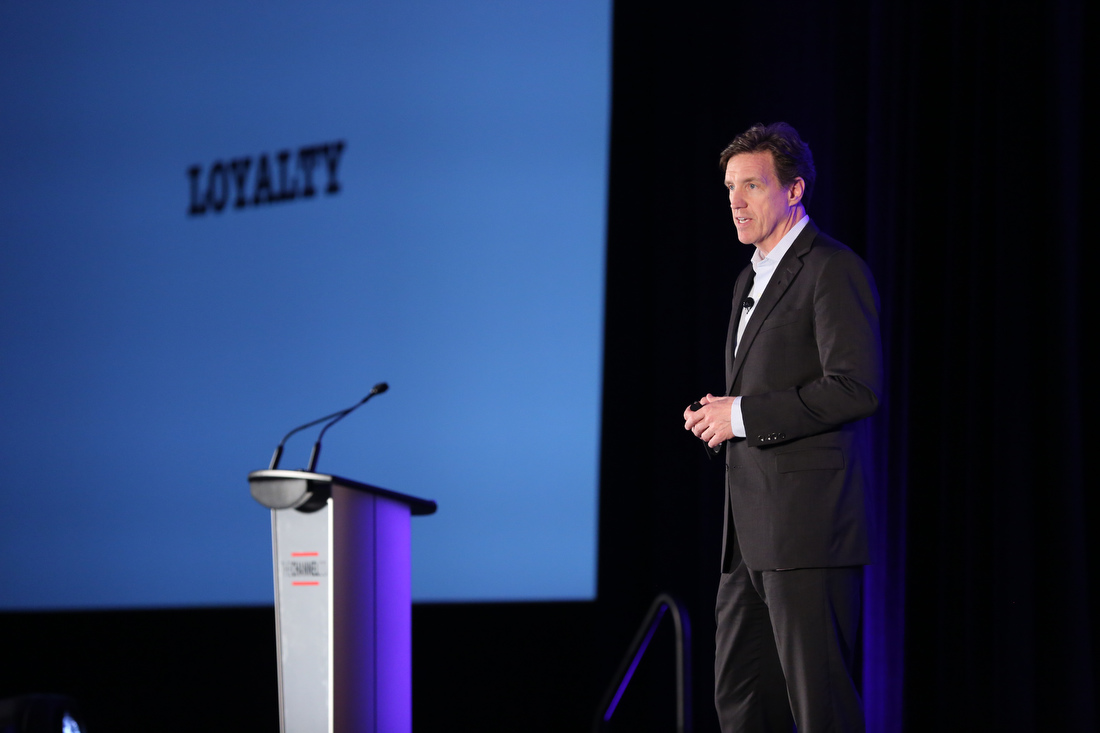
Midsize Enterprise Summit keynote speaker and behavioral scientist gives event attendees a lesson on loyalty.
A common challenge for many CIO and senior IT leaders, today, is understanding how to build strong and loyal relationships with customers, employees and partners.
There is a science to building loyalty. Failure to understand and apply the basic principles can result in losing sales revenue, business relationships and employees.
Hundreds of attendees at the Midsize Enterprise Summit (MES) in Nashville learned about building loyalty from behavioral scientist and consultant James Kane, who is considered one of the world’s foremost experts on what makes someone truly loyal — to another person, organization or cause.
Kane has helped some of the largest and best known organizations in the world — Apple, Marriott Hotels, Major League Baseball — build unbreakable relationships with their key constituents by combining the latest research in neurology, anthropology and behavioral psychology.
Can’t Buy Me Love
Early in his keynote presentation, Kane addresses the misconception that people are loyal to a brand. Reward programs, for example, will not guarantee loyalty. The truth is companies cannot buy a person’s love or loyalty (“these two are first cousins,” according to Kane). People are loyal to humans or a thing, especially when that someone or something makes their life easier, safer or better and is widely known to be reliable and trustworthy.
Tips To Earning Trust
Earning trust is a big component of achieving loyalty. Kane points out that while our brains have significantly evolved over thousands of years, every human innately wants to know who to trust or not. It is a survival mechanism.
“When we recognize specific behaviors in others, especially in the way they interact with us, we know it is safe to be loyal to that person,” said Kane.
Many factors play a role in earning trust, including character (integrity), competency (ability to do the job as expected), consistency (behaving in a consistent and dependable manner) and capacity (having adequate resources to do the task or job). “When we interact with someone, we look to see if their standards and behaviors are the same as ours,” he added.
Loyalty Equals Sense Of Belonging
One of the building blocks in creating loyalty is conveying a sense of belonging. For instance, customers and employees want to feel that a company or their supervisor, respectively, recognizes them as an individual and understands what makes them unique (personality, interests, talents, etc.).
To illustrate this point, Kane pointed out that he has seen many supervisors miss the key insights that employees are showcasing simply by what they hang on the wall of their cubicles. “Your employees are telling you who they are versus what they do by the items they hang in their office space, like a family picture or their favorite sports team emblem,” said Kane.
To help increase the sense of belonging, it’s important to recognize that people want to feel part of a group, either for protection (human instinct) or perhaps the desire to give each other new ideas. Kane says it is important to make employees and customers feel included because “if a group excludes someone, they will go and find another group that will include them.” Managers know it is critical to retain top talent.
Looking For Like Minds
But not just any alternative group will do. People want to identify with others, because our brains are hardwired to look for similarities with other people. “People follow people, because they share the same interests and beliefs, and they want the same things.” It’s as simple as employees like to be around people like themselves.
Armed with this insight, managers should consider sharing personal interests with customers and employees as a positive way to eliminate pre-conceived notions and ideally build more connection and trust with that individual. (This explains why in his presentation introduction, Kane shared many personal facts about his family life and personal interests. It definitely helped engage the audience and increased their interest to find similar interests and connection with this engaging speaker.)
The MES attendees were given many more insights that are too extensive to adequately address in this article. To learn more about Kane’s research and proven methods to build loyalty, check out his website, http://www.jameskane.com. James also has two upcoming books, “The Loyalty Switch” and “Virtually Loyal,” that are soon to be released and offer detailed insight on how leaders can foster loyalty across business platforms.
Janice Cain, MBA, is an award-winning strategic marketing consultant, content marketing writer and PR advisor who has been working extensively in the IT industry for more than 10 years with some of the world’s best known software and hardware companies. Follow her @1010_Marketing








